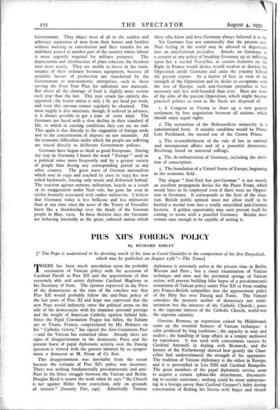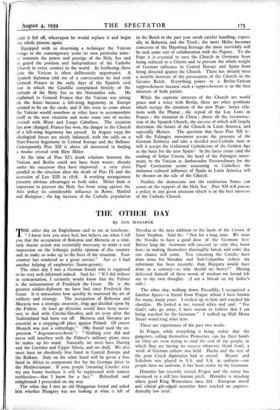PIUS XII'S FOREIGN POLICY
By RICHARD BIRLEY
[" The Pope is understood to be devoting much of his time at Castel Gandolfo to the composition of his first Encyclical, which may be published on August sth."—The Times] THERE has been much speculation upon the probable orientation of Vatican policy with the accession of Cardinal Pacelli as Pius XII and the appointment of that extremely able and astute diplomat Cardinal Maglione as his Secretary of State. The opinion expressed in the Press of the democracies at the time of the conclave was that Pius XII would probably follow the anti-Nazi policy of the last years of Pius XI and hope was expressed that the new Pope would indirectly enter the political arena on the side of the democracies with his immense personal prestige and the weight of American Catholic opinion behind him. Since the Papal Coronation Prague has fallen, the Italians are in Tirana, Franco, congratulated by His Holiness on his " Catholic victory," has signed the Anti-Comintern Pact —and the Vatican has remained silent. Already there are signs of disappointment in the democratic Press and the present burst of papal diplomatic activity over the Danzig question is viewed with the gravest mistrust by so sympto- matic a democrat as M. Nizan of Ce Soir.
This disappointment was inevitable from the outset because the estimate of Pius XI's policy was incorrect. There was nothing fundamentally pro-democratic and anti- Nazi in the bitter struggle between the Vatican and Berlin. Douglas Reed is nearer the truth when he says " the Church is not against Hitler from conviction, only on grounds of interest " (Insanity Fair, 249). Admittedly Vatican diplomacy is extremely active at the present time in Berlin, Warsaw and Paris ; but a closer examination of Vatican technique and aims and the perennial springs of Vatican action, will prevent building false hopes of a pro-democratic orientation of Vatican policy under Pius XII or from reading pro Franco-British sympathies into the appeasement policy of the Holy See over Danzig and Tunis. The Vatican considers the interests neither of democracy nor totali- tarianism but the interests of the Catholic Church ; peace is the supreme interest of the Catholic Church, world-war the supreme calamity.
Gravitas Romana, an expression coined by Hildebrand, sums up the essential features of Vatican technique: a calm produced by long traditions ; the capacity to wait and outlive ; the handling of large affairs in a temper mellowed by experience. It was used with consummate success by Cardinal Antonelli in dealing with Bismarck, and the history of the Kulturkampf showed how greatly the Chan- cellor had underestimated the strength of his opponents. The tradition of Vatican diplomacy is the oldest in Europe, and it is personified in Leo XIII and Cardinal Rampolla. The great members of the papal diplomatic service seem to acquire a certain sphinx-like detachment, disconcert- ing to secular statesmen ; nothing could be more embarrass- ing to a foreign envoy than Cardinal Gasparri's habit during conversation of flicking his biretta with finger and thumb until it fell off, whereupon he would replace it and begin the whole process again.
Equipped with so disarming a technique the Vatican brings to the contemporary scene its own particular aims: to maintain the power and prestige of the Holy See and to guard the position and independence of the Catholic Church in every country in the world. In furthering these aims the Vatican is often deliberately opportunist. A Spanish diplomat told me of a conversation he had with General Franco in the early days of the Spanish civil war in which the Caudillo complained bitterly of the attitude of the Holy See to the Nationalist side. He explained to General Franco that the Vatican was sitting on the fence because a left-wing hegemony in Europe seemed to be on the cards, and if this were to come about the Vatican would somehow or other have to accommodate itself to the new situation and make some sort of modus vivendi with Blum and Largo Caballero. The situation has now changed, Franco has won, the danger to the Church of a left-wing hegemony has passed. In August 1939 the ideological forces are nicely balanced, with the odds on a Nazi-Fascist hegemony in Central Europe and the Balkans. .Consequently Pius XII is above all interested in finding a modus vivendi with Herr Hitler.
At the time of Pius XI's death relations between the Vatican and Berlin could not have been worse; already under his successor they have improved: a very close parallel to the situation after the death of Pius IX and the accession of Leo XIII in 1878. A working arrangement presents obvious advantages to both sides. Hitler finds it important to prevent the Holy See from using against the Axis policy its considerable influence in Rome, Madrid and Budapest ; the big increase of the Catholic population in the Reich in the past year needs careful handling, especi- ally in Bohemia and the Tyrol ; the more Hitler becomes conscious of the Hapsburg heritage the more inevitably will he seek some sort of collaboration with the Papacy. To the Pope it is essential to save the Church in Germany from being reduced to a Ghetto and to prevent the whole weight of German influence in Central Europe and Spain from being directed against the Church. There has already been a notable decrease of the persecution of the Church in the Greater Reich. Everything points to a Berlin-Vatican rapprochement because such a rapprochement is in the best interests of both parties.
While the supreme interests of the Church are world peace and a truce with Berlin, there are other problems which occupy the attention of the new Pope: better rela- tions with the Phanar ; the repeal of the Lay Laws in France ; the situation in China ; above all the reconstruc- tion of the Spanish Church, the success of which will largely determine the future of the Church in Latin America, and especially Mexico. The question that faces Pius XII is: will the Falangist movement accept the pressure of the German Embassy and take a decided anti-Catholic turn or will it accept the traditional Catholicism of the Golden Age as the basis for the new Spain? In the latter event (and the sending of Sefior Cuesta, the head of the Falangist move- ment, to the Vatican as Ambassador Extraordinary for the Papal Coronation seems reassuring to Catholics) the immense cultural influence of Spain in Latin America will be thrown on the side of the Church.
Neither the democratic nor the totalitarian States can count on the support of the Holy See. Pius XII will pursue a policy in any given situation which is in the best interests of the Catholic Church.









































 Previous page
Previous page